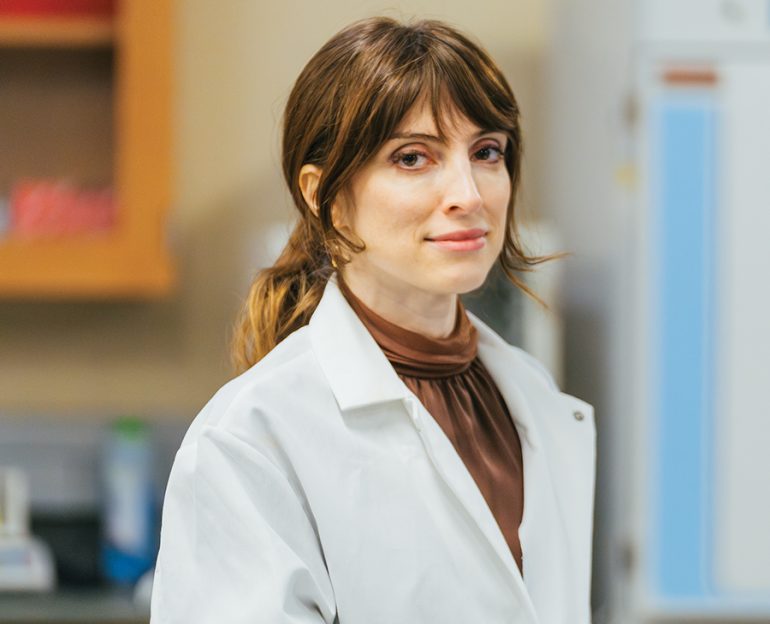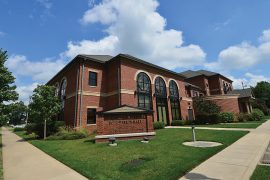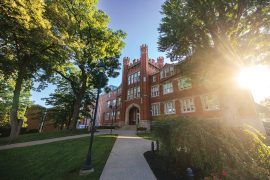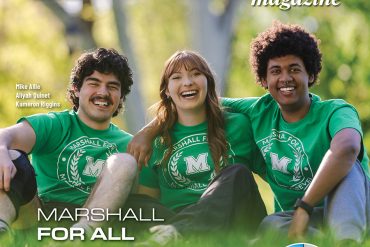MU 72 | FALL 2024
Dr. Nasim Nosoudi
Assistant professor, Biomedical Engineering
Dr. Nasim Nosoudi is the first faculty member in Marshall’s College of Engineering and Computer Sciences to receive a U.S. National Science Foundation CAREER Award. According to the foundation, the award identifies and supports “early-career faculty who have the potential to serve as academic role models in research and education and to lead advances in the mission of their department or organization.”
She will receive $604,047 over the next five years for her research project, “Exploring the Differentiation of Mesenchymal Stem Cell to Chondrocytes After Electrospraying.”
Education and career background:
Bachelor’s degree in material engineering from Iran University of Science and Technology, master’s in biomedical engineering from Amirkabir University of Technology (Polytechnic), Ph.D. in bioengineering from Clemson University.
Joined Marshall in 2019, following three years at Wright State University.
Can you tell us the basics of what your job entails?
Teaching involves course preparation, lecturing, assessment, office hours, curriculum development, supervising students and academic advising.
In addition to teaching, I spend time conducting research, publishing, grant writing and sharing research findings at conferences, workshops and other academic forums.
As a faculty member, I also have departmental duties like participating in department meetings, serving on committees and other administrative tasks.
What are your thoughts on being the first in your college to earn an NSF CAREER Award, and what do you hope to accomplish?
Being the first in my college to earn the NSF CAREER Award is an incredible honor. It feels gratifying to see my hard work and dedication recognized at such a high level. This achievement is not just a personal milestone but also a testament to the supportive and collaborative environment within our college. I hope this accomplishment can inspire my colleagues and students to pursue their goals with determination and passion.
What do you hope is the impact of your work?
If this project succeeds, using the patient’s own adipose-derived stem cells to create a customized population of chondrocytes for cartilage repair, it could significantly enhance the effectiveness of cell therapies and regenerative treatments.
Cell therapies and regenerative treatments are used to address a variety of medical issues. Some of the main areas they can help with include:
Repairing damaged tissues from injuries, like cartilage damage in joints or heart tissue after a heart attack.
Degenerative diseases, such as osteoarthritis and Parkinson’s disease, where therapies and treatments aim to regenerate lost or damaged cells.
Autoimmune diseases like multiple sclerosis, where the therapy can modulate the immune system.
Wound healing and skin regeneration, especially for burns or chronic wounds.
What do you love about your job?
As a professor, I love my job because it allows me to profoundly impact young lives and shape their futures. Teaching gives me the opportunity to inspire and mentor students, guiding them as they develop their knowledge and skills.
Additionally, I have the privilege of conducting research, exploring unknowns and contributing to advancements in my field. This combination of educating the next generation and pushing the boundaries of science makes my work incredibly fulfilling and meaningful.
Based on your work, what have you learned that you wish everyone knew?
Combining principles from different fields can lead to great advancements. Also, I wish everyone knew that with dedication and effort, anything is possible.





